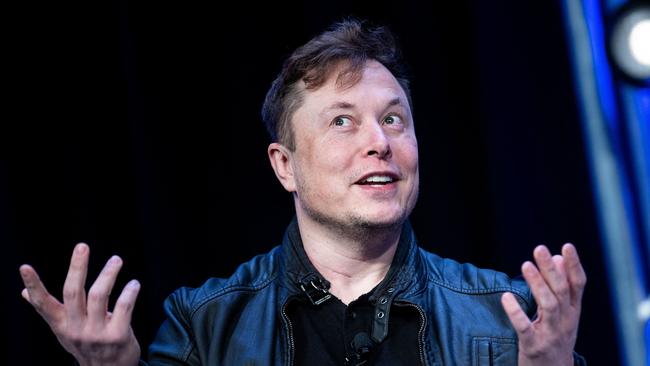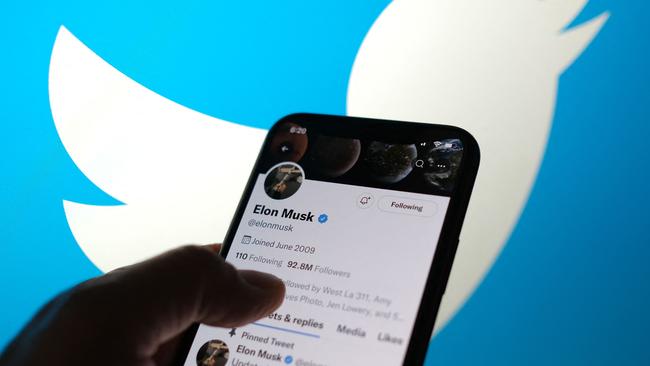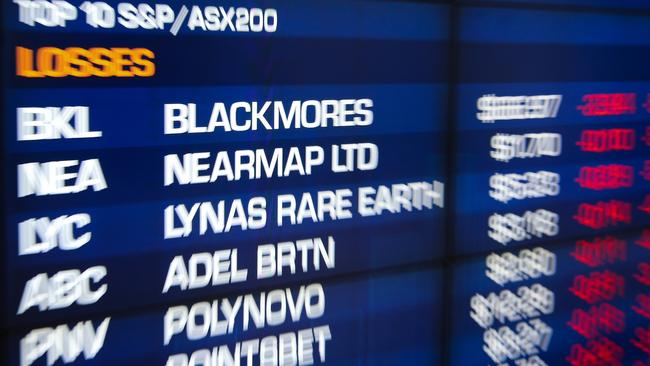
To be frank, it’s not about fake accounts that have proliferated across the social media network that suddenly had Musk upset, it’s all about valuations.
By backing himself into a corner in making a heady move on the social media network, Musk and his funders have now grasped at a chance to renegotiate improved terms or even better – an escape hatch – than risk seeing billions of dollars vaporised.
Twitter deal temporarily on hold pending details supporting calculation that spam/fake accounts do indeed represent less than 5% of usershttps://t.co/Y2t0QMuuyn
— Elon Musk (@elonmusk) May 13, 2022
Since the Tesla founder secured agreement for a deal from Twitter’s board late last month, technology stocks including here in Australia have taken a further beating.
The tech-heavy Nasdaq has fallen 9 per cent since then, at one point it was off 12 per cent. The losses among individual stocks have been greater. Twitter shares in that period have fallen more than 20 per cent with the company valued at “just” $US31bn – even with implied support from Musk’s all-cash bid.
In between tweeting about the impracticality of bans on plastic straws and US President Joe Biden, Musk says he is “still committed” to the buyout of the microblogging site. But few, including Steve Johnson the co-founder of Australian value fund manager Forager Funds expect him to follow through.
Johnson, a veteran fund manager, has ridden what he calls the Twitter rollercoaster over the past 18 months, although has sold down half of his exposure in the social media company in recent weeks.
Still committed to acquisition
— Elon Musk (@elonmusk) May 13, 2022
“I find it hard to imagine that fake accounts is something that’s a massive shock to Elon Musk. And he said right from the start or something he wanted to fix. So you know, whether it’s 5 per cent or 2 per cent, or 10 per cent, it’s a problem he wants to fix,” he says.
During last week’s sharp falls in technology stocks Johnson says “the probability was already increasing that he (Musk) was going to walk away from this”.
“The fact that he tweets that he’s putting it on hold for me, it doesn’t actually change the probabilities that dramatically”.
Wrong time
The Tesla mega-billionaire made his move on the troubled tech company at exactly the wrong time.
US interest rates were already rising and the threat of more to come has been sucking excess cash out of tech stocks back into increasingly attractive bonds as well as old economy corporate names that can defy inflation.
The Musk deal comes with a break fee of $US1bn, which is more palatable than paying the full $US44bn. There is a risk that Twitter can potentially enforce completion of the transaction behalf of major shareholders through the courts.
As it stands Musk is already billions of dollars ahead. He sold more than $8.5bn shares in Tesla in days after securing support and since then shares in the electric vehicle company have fallen 20 per cent, which puts him nearly $US2bn in front compared to if he sold today. His personal wealth is still estimated at $US274bn.

Musk took aim at Twitter’s fake accounts saying he was putting his bid on hold needed more details from Twitter’s own estimation that fake and spam accounts make up less than 5 per cent of total accounts. Of course what we don’t know is the volume of traffic that comes from the fake accounts. In its filings Twitter has also conceded the actual number of false or spam accounts could be higher than estimated.
From Facebook, Instagram to Twitter, fake accounts have clung to social media. They have been distorting numbers forever and the overall valuation of a platform often rises or falls on user numbers. Musk for his part had questioned the fake accounts leading up to the bid.
Twitter has average monetisable daily active users or real accounts of 229m during the March quarter, with 39m based in the US.
Twitter’s still heavy reliance on text over video has seen it fall behind rival platforms, including Instagram (1.39bn users) which is owned by Facebook’s Meta. While TikTok (owned by China’s ByteDance) has spread faster among younger users and has an estimated 755m users. Facebook itself is estimated to have 2.18bn users.
Tech meltdown
The Twitter drama comes in the backdrop or savage sell down in technology stocks. Here the world for newer investors has flipped upside down. New economy stocks are suddenly unloved while old economy stocks such as coal miners Whitehaven and Yancoal are riding the commodities boom and pushing record highs while paying off debt.
Here, the ASX’s All Technology index, which includes more established players including caresales.com, Seek, Computershare and Xero is off more than 36 per cent from its peak last September and more than 15 per cent in the past month alone. Across other tech names the losses are striking for their steep losses.

Online retailers including Booktopia, Kogan. Redbubble and Adore Beauty are feeling the fallout as investors adjust to rising interest rates. Adore Beauty has lost more than 70 per cent of its value from its one year peak, Kogan.com is down 72 per cent. Booktopia is off 84 per cent from its peak and Redbubble 75 per cent.
Elsewhere, Block/Afterpay is down 35 per cent since the US payments major listed on the ASX in December, artificial intelligence player Appen is off 85 per cent from its peak and accounting software group Xero is down 45 per cent from its peak.
While share valuations were clearly overbid while interest rates were near record lows, the collapse will hurt the same companies that are loss making or need to raise funds to help future expansion.
More pain
Forager’s Johnson for his part warns there’s more pain to come for Australian tech investors as interest rates push higher.
He cautions that even with more established business models there are still shades of the dot.com bust of the early 2000 which saw a lot of early stage tech businesses sink to nothing.
“This was a proper bubble in the tech space,” he says of the run-up during the Covid share boom. “There are businesses out there even still today that have very big market caps, that will be surprised if they ended up being worth anything”.
“I don’t feel like that has fully run its course yet in terms of businesses really being valued at what they’re worth – which is probably close to nothing. So there is a pocket there that I think is almost a replay of what we saw in 2000”.
He is not alone. Calculations by brokerage Macquarie suggest there is plenty more downside to go when it comes to tech investing.
The broker looked at Australian listed tech shares through a longer term lens on a measure of enterprise value to sales. Given not all tech companies generate earnings, this measures how much it would cost to acquire a company based on sales.
Here it found valuations of a basket of eight Australian tech companies including Xero, Wisetech and Altium are off peak trading multiples, but still trading at a 33 per cent premium compared to 2010 to 2015 period for technology stocks and around a 100 per cent premium compared to the decade prior.

“History suggests a sector reset may take longer and be more painful than current market expectations,” Macquarie says.
But the lessons from the dot.com crash for investors is to fund companies that had real businesses underpinning them – not just promise.
Johnson says tech investing has changed in that fund managers no longer have to bet on a “tech” company for exposure to a higher growth stock.
“Technology has become so pervasive in every single company and throughout society, right, that you can put together quite a diversified portfolio of industry exposures, and invest only in the space, companies providing technology to customers and businesses all throughout the economy”.
Australian tech names emerging from the 2000s tech crash such as Seek, Computershare and Iress turned into major companies with international reach – but after many lean years they rewarded investors that were prepared to stay for the long haul.
johnstone@theaustralian.com.au




Elon Musk’s early morning call to pause his audacious $US44bn ($63bn) Twitter bid shows the world’s richest man expects more pain to come for technology stocks.